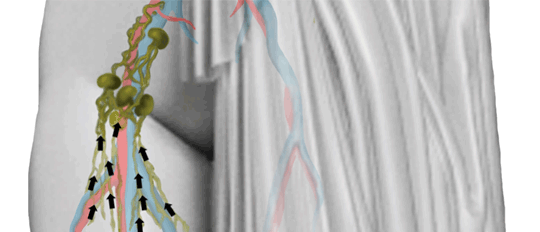Lymphedema Treatment Clinic
The term “Lymphedema” is composed of two words: “lymph” and “edema.” “Edema” stands for the diffuse accumulation of any type of fluid in the soft tissue, more specifically: in between cells of this tissue. In case of localized accumulation of fluid, it is usually named according to the type of fluid “seroma,” “hematoma,” or “biloma” for serous fluid, blood, or bile correspondingly. The word “lymph” indicates the type of fluid which composes the above edema. Lymphedema usually develops as a consequence of the disruption of the lymph nodes draining this particular area of the body. The most common cause of lymphedema in the world is the damage of the nodes by filaria, a parasite endemic to subtropical areas of Africa, Asia, and Central and South America.

In developed countries, however, the most common cause of lymphedema includes surgical resection of affected lymph nodes during a diagnostic or therapeutic excisional biopsy in patients with malignant lesions. Rarely lymphedema can be caused by congenital dysfunction of the specific lymphatic group. In an overwhelming majority of cases, it affects only one extremity and is usually observed early in life. Lymphedema overall is being overdiagnosed: non-lymphatic edema is being incorrectly diagnosed as lymphedema.
What are the Symptoms of Lymphedema?
Lymphedema signs and symptoms include:
- Swelling of the arm or leg, including fingers or toes
- A feeling of heaviness
- A feeling of tightness
- Restricted range of motion
- Recurring infections
- Hardening/thickening of the skin (fibrosis)
Make an appointment at our lymphedema treatment clinic if you notice persistent swelling, heaviness, and tiredness in your leg. If there is any sudden dramatic increase in the size and swelling of the limb, and you’ve already been diagnosed with lymphedema, visit a doctor right away.
What Causes Lyphemdema?
Lymphedema occurs when the lymph vessels are not able to adequately drain lymph fluid. Lymph nodes act as filters with cells that fight cancer and other infections. The lymphatic system is a network of vessels that carries protein-rich fluid throughout the body. It’s part of the immune system. The lymph fluid is pushed through the vessels of your arms and legs by muscle contractions as you move throughout the day.
The most common causes of lymphedema include:
- Cancer. If cancer cells block lymph vessels, lymphedema may result. For example, a tumor growth near a lymph vessel could enlarge enough to block the flow of the fluid.
- Radiation treatment for cancer. Radiation treatment may cause scarring or inflammation of lymph nodes and lymph vessels.
- Surgery. During cancer surgery, lymph nodes are often removed to verify if the disease has spread. This does not always result in lymphedema.
- Parasites. Lymphatic filariasis is commonly spread by mosquitoes in developing tropic countries. This is an infection of threadlike worms that clog the lymph nodes.
Less commonly, lymphedema may result from inherited conditions where the lymphatic system does not develop properly.
Lymphedema Treatment Clinic in Manhattan, Brooklyn, and NYC
New York Vein Treatment Center can help diagnose Lymphedema and other circulation-related conditions. We helped thousands of patients in the New York area. Contact us to schedule your consultation. Dr. Khitin is a known expert in venous disorders, phlebology, and cardiovascular and thoracic medicine. New York Vein Treatment Center is a lymphedema treatment clinic in Manhattan, Brooklyn, and the surrounding New York area to help manage any symptoms and complications of venous disorders.
New York Vein Treatment Center can help diagnose this and other circulation related conditions. We helped thousands of patients in the New York area. Contact us to schedule your consultation.
Start Your Journey To Feeling Good Again!
Schedule your Appointment Today with NYC's most Trusted and Comprehensive Vein Treatment Center

